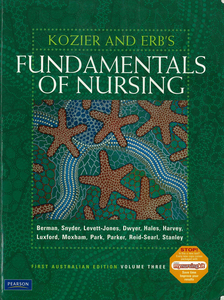Self-concept
Park, Tanya (2010) Self-concept. In: Berman, Audrey, Snyder, Shirlee J., Kozier, Barbara, Erb, Glenora, Levett-Jones, Tracy, Dwyer, Trudy, Hales, Majella, Harvey, Nichole, Luxford, Yoni, Moxham, Lorna, Park, Tanya, Parker, Barbara, Reid-Searl, Kerry, and Stanley, David, (eds.) Kozier and Erb's Fundamentals of Nursing. Pearson Australia, Frenchs Forest, NSW, Australia, pp. 1056-1072.
![[img]](https://researchonline.jcu.edu.au/16210/1.hassmallThumbnailVersion/16210_Park_2010_Book_cover.jpg)
|
Image (JPEG) (Book Cover)
- Cover Image
Download (2MB) |
|
|
PDF (Published Version)
- Published Version
Restricted to Repository staff only |
Abstract
For years Kozier & Erb’s Fundamentals of Nursing has been the gold standard in helping students embarking on their nursing careers. This first Australian edition retains many of the features that have made this textbook the number-one choice of nursing students and lecturers.
To further enhance this popular fundamentals textbook and ensure its appropriate application for Australian students, nursing academics from across Australia were invited to review and comment on each of the 52 chapters. Their detailed feedback has ensured that Kozier & Erb’s Fundamentals of Nursing: First Australian Edition is a current, engaging and uniquely Australian textbook that will help students succeed in their nursing studies.
Kozier and Erb’s Fundamentals of Nursing, First Australian Edition presents the fundamentals of nursing care within the framework of the nursing process. This text offers an accessible writing style; a focus on practical application with real-world Australian examples and case studies; appropriate Australian terminology, policies and procedures, Australian visuals; an integrated approach to Australian Indigenous health issues; and up-to-date references, research and codes of practice, with reference to ANMC guidelines. The text is supported by a state-of-the art technology package to enhance the learning process.
Chapter 39: Self-concept is one's mental image of oneself. A positive self-concept is essential to a person's mental and physical health. Individuals with a positive self-concept are better able to develop and maintain interpersonal relationships and resist psychologic and physical illness. An individual possessing a strong self-concept should be better able to accept or adapt to changes that may occur over the life span. How one views oneself affects one's interaction with others. Nurses have a responsibility to assess clients for a negative self-concept and to identify the possible causes in order to help them develop a more positive view of themselves. Individuals who have a poor self-concept may express fee lings of worthlessness, self-dislike or even self-hatred. They may feel sad or hopeless and may state they lack energy to perform even the simplest of tasks.
LEARNING OUTCOMES - Identify four dimensions of self-concept. - Give Erikson's explanation of the effects of psychosocial tasks on self-concept and-self-esteem. - Describe the four components of self-concept. - Identify common stressors affecting self-concept and coping strategies. - Describe the essential aspects of assessing role relationships. - Identify nursing diagnoses related to altered self-concept. - Describe nursing interventions designed to achieve identified outcomes for clients with altered self-concept. - Describe ways to enhance client self-esteem. - Define the components of emotional intelligence. - Describe your culture.
| Item ID: | 16210 |
|---|---|
| Item Type: | Book Chapter (Teaching Material) |
| ISBN: | 978-1-4425-0471-4 |
| Keywords: | body image, core self-concept, cultural safety, emotional intelligence, global self, global self-esteem, ideal self, role, role ambiguity, role conflicts, role development, role mastery, role performance, role strain, self-awareness, self-concept, self-esteem, specific self-esteem |
| Date Deposited: | 27 Apr 2011 01:22 |
| FoR Codes: | 11 MEDICAL AND HEALTH SCIENCES > 1110 Nursing > 111099 Nursing not elsewhere classified @ 100% |
| SEO Codes: | 92 HEALTH > 9202 Health and Support Services > 920210 Nursing @ 100% |
| Downloads: |
Total: 154 Last 12 Months: 4 |
| More Statistics |



